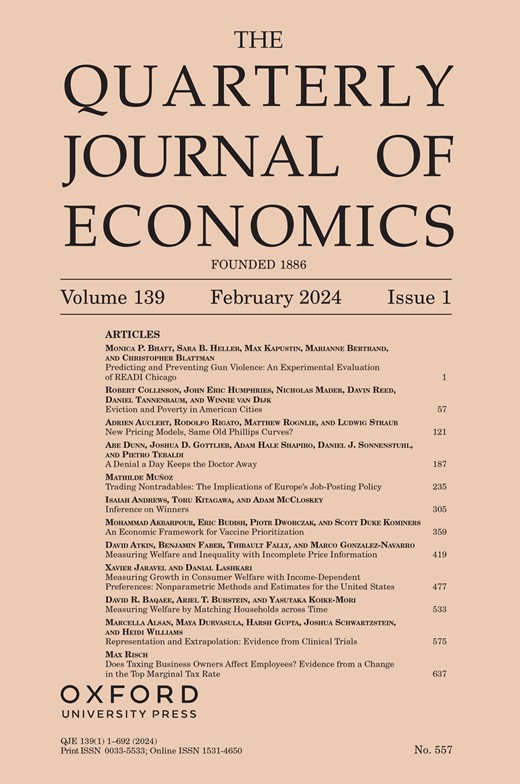拨款、曲线评分与非市场中相对评价的悖论
IF 12.7
1区 经济学
Q1 ECONOMICS
引用次数: 0
摘要
摘要:本文建立了一个非市场资源配置模型,如向有价值的项目授予资助,向优秀学生授予荣誉,或向优质出版物授予期刊名额。在供应方面,可用的拨款预算被授予根据审稿人可获得的嘈杂信息进行最有利评估的申请人。在需求方面,考虑到申请费用高昂,实力较强的候选人更有可能获得资助,从而自主选择申请。我们确定,如果评估是完美的,那么在曲线上评分是无效的,即使是最优秀的候选人也不会申请。更一般地说,当预算不足以向所有申请者发放资助时,如果信息足够对称,平衡就会被打破——这就是相对评估的悖论。利用Lehmann首创的基于分位数函数的技术,我们描述了一套广泛的非市场分配规则,在该规则下,一个领域(或课程)中评估噪声的增加会提高该领域的均衡应用,并减少所有其他领域的应用。我们通过利用欧洲研究理事会将总预算分配给不同领域的应用程序的规则的变化,从经验上证实了这些比较静态数据,表明自己的评估噪声增加一个标准差,导致应用程序数量和预算份额增加0.4个标准差。此外,我们还获得了评估机构设计的见解,特别是关于领域或课程噪声的内生选择以及领域到面板的最佳聚合。本文章由计算机程序翻译,如有差异,请以英文原文为准。
Grantmaking, Grading on a Curve, and the Paradox of Relative Evaluation in Nonmarkets
Abstract The paper develops a model of nonmarket allocation of resources such as the awarding of grants to meritorious projects, honors to outstanding students, or journal slots to quality publications. On the supply side, the available budget of grants is awarded to applicants who are evaluated most favorably according to the noisy information available to reviewers. On the demand side, stronger candidates are more likely to obtain grants and thus self-select into applying, given that applications are costly. We establish that if evaluation is perfect, grading on a curve inefficiently discourages even the very best candidates from applying. More generally, when the budget is insufficient to award grants to all applicants, the equilibrium unravels if information is symmetric enough—the paradox of relative evaluation. Leveraging a technique based on the quantile function pioneered by Lehmann, we characterize a broad set of nonmarket allocation rules under which an increase in evaluation noise in a field (or course) raises equilibrium applications in that field, and reduces applications in all other fields. We empirically confirm these comparative statics by exploiting a change in the rule for apportioning the total budget to applications in different fields at the European Research Council, showing that a one standard deviation increase in own evaluation noise leads to a 0.4 standard deviation increase in the number of applications and budget share. Moreover, we derive insights for the design of evaluation institutions, particularly regarding the endogenous choice of noise by fields or courses and the optimal aggregation of fields into panels.
求助全文
通过发布文献求助,成功后即可免费获取论文全文。
去求助
来源期刊

Quarterly Journal of Economics
ECONOMICS-
CiteScore
24.20
自引率
2.20%
发文量
42
期刊介绍:
The Quarterly Journal of Economics stands as the oldest professional journal of economics in the English language. Published under the editorial guidance of Harvard University's Department of Economics, it comprehensively covers all aspects of the field. Esteemed by professional and academic economists as well as students worldwide, QJE holds unparalleled value in the economic discourse.
 求助内容:
求助内容: 应助结果提醒方式:
应助结果提醒方式:


